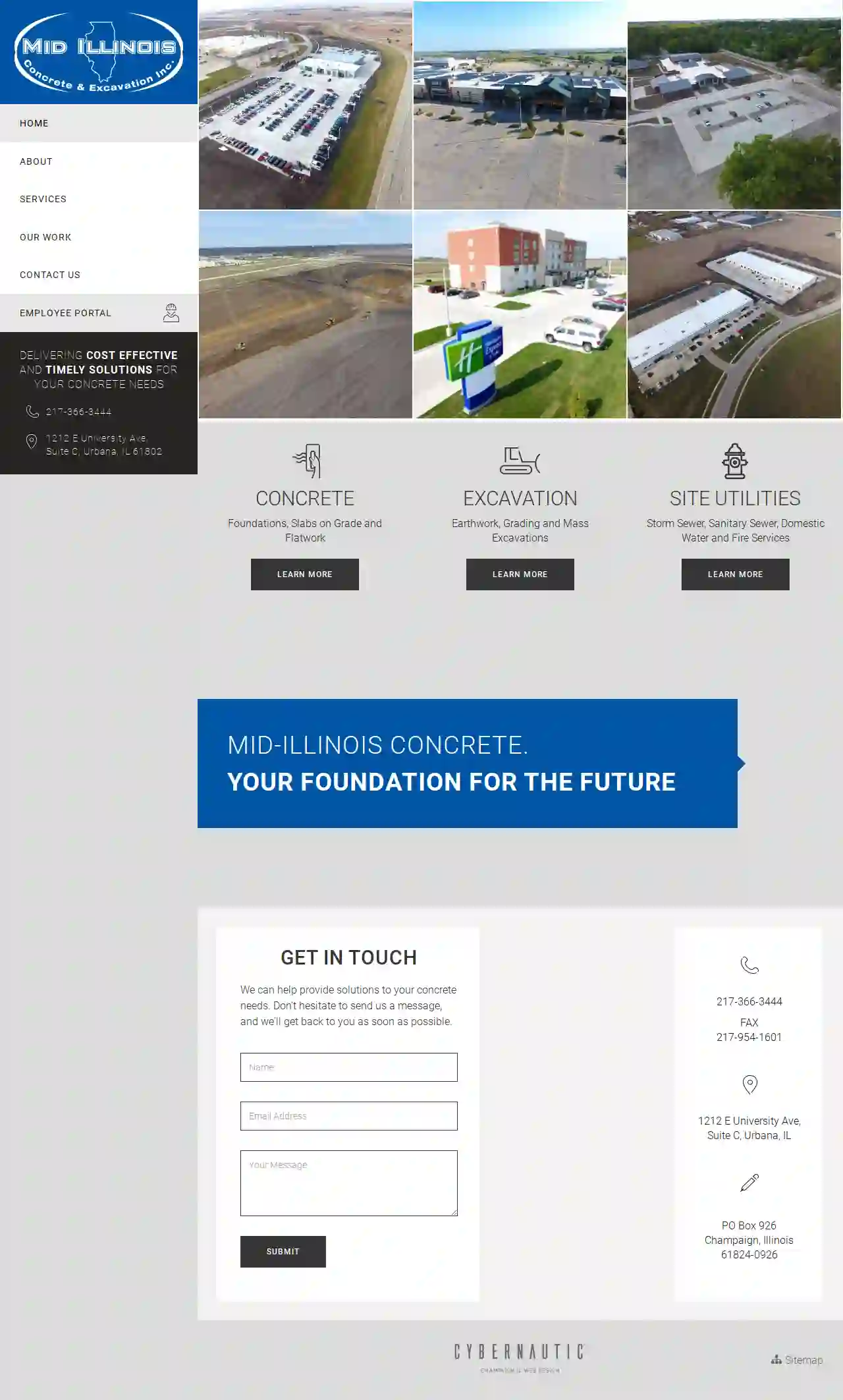Dirt Contractors Erie
Top Dirt Contractors in Erie
Get multiple Dirt Contractors quotes for your project today! Compare profiles, reviews, accreditations, portfolio, etc... and choose the best deal.

Mid Illinois Concrete & Excavation
54 reviews1212 E University Ave, Suite C, Urbana, IL, 61802, USMid-Illinois Concrete is your foundation for the future. We are a full-service excavation, utility, and concrete contractor serving the Champaign-Urbana area. We are committed to providing our clients with cost-effective and timely solutions for all their concrete needs. Our team of experienced professionals is dedicated to delivering high-quality workmanship and exceptional customer service. We have a proven track record of success in a wide range of projects, including: Foundations Slabs on grade Flatwork Earthwork Grading Mass excavations Storm sewer Sanitary sewer Domestic water Fire services We are committed to safety and quality, and we are proud to be a member of the following organizations: Illinois Concrete Association National Ready Mixed Concrete Association Contact us today to learn more about how we can help you with your next project.
- Services
- Why Us?
- Gallery
Get Quote
Ohio Erie Excavating
1Erie, USWe are excited to announce that ohioerie.com is almost ready to launch! Get started by uploading your website. Need help? Visit our Admin Panel or contact DreamHost for support.
- Services
- Why Us?
Get Quote
Erie Excavating & Liquid Waste
53 reviewsErie, US- Services
- Why Us?
Get Quote
Over 3,943+ Excavation Contractors on our directory
Our excavation pros operate in Erie & surroundings!
ExcavationHQ has curated and vetted the Best Excavation Contractors near Erie. Find a trustworthy pro today.
Frequently Asked Questions About Dirt Contractors
- Clearly Define Your Project Scope: Provide the contractor with detailed information about your project, including the size of the area, the type and volume of dirt needed, the desired grading or leveling, and any specific requirements.
- Obtain Multiple Quotes: Request quotes from multiple reputable dirt contractors to compare prices, services, and experience. Ensure the quotes are comprehensive and include all project details.
- Verify Licensing and Insurance: Confirm that the contractor has the necessary licenses, insurance coverage, and a good safety record. This protects you from potential liabilities.
- Communicate Openly and Regularly: Maintain open communication with the contractor throughout the project, addressing any questions, concerns, or changes promptly. Regular updates and site visits can help ensure everything is on track.
- Document Everything: Keep written records of all communication, contracts, quotes, and invoices for reference and accountability.
- Dirt Removal: Excavating and hauling away excess dirt or soil from construction sites, landscaping projects, or other areas.
- Dirt Delivery: Transporting and delivering various types of dirt, such as topsoil, fill dirt, sand, or gravel, for construction, landscaping, or gardening purposes.
- Grading: Leveling or sloping land to achieve specific contours for drainage, landscaping, or construction projects.
- Excavation: Digging trenches, foundations, basements, pools, or other structures requiring earthmoving.
- Land Clearing: Removing trees, vegetation, and debris to prepare land for development or other uses.
- Site Preparation: A combination of services, including clearing, grading, and compaction, to prepare a site for construction or landscaping.
- Environmental Site Assessment: Hire a qualified environmental consultant to conduct a Phase I Environmental Site Assessment (ESA). This involves reviewing historical records, conducting site reconnaissance, and interviewing relevant parties to identify potential environmental concerns.
- Soil Sampling and Testing: If the ESA indicates potential contamination, soil samples will be collected and analyzed in a laboratory for the presence of specific contaminants, such as heavy metals, pesticides, or petroleum products.
What are some tips for working with dirt contractors?
What services do dirt contractors provide?
How much dirt do I need for my project?
1. **Measure the area:** Determine the length, width, and depth (in feet) of the area where you need dirt.
2. **Calculate the volume:** Multiply the length x width x depth to get the volume in cubic feet.
3. **Convert to cubic yards:** Divide the cubic feet volume by 27 (there are 27 cubic feet in one cubic yard).
**Example:**
If your area is 10 feet long x 5 feet wide x 2 feet deep, the volume would be: 10 x 5 x 2 = 100 cubic feet
To convert to cubic yards: 100 / 27 = 3.7 cubic yards (round up to 4 cubic yards to ensure you have enough).
It's advisable to consult with a dirt contractor or landscaper for more accurate calculations, especially for complex projects or irregular-shaped areas.
How do I know if the dirt I need is contaminated?
What are some tips for working with dirt contractors?
- Clearly Define Your Project Scope: Provide the contractor with detailed information about your project, including the size of the area, the type and volume of dirt needed, the desired grading or leveling, and any specific requirements.
- Obtain Multiple Quotes: Request quotes from multiple reputable dirt contractors to compare prices, services, and experience. Ensure the quotes are comprehensive and include all project details.
- Verify Licensing and Insurance: Confirm that the contractor has the necessary licenses, insurance coverage, and a good safety record. This protects you from potential liabilities.
- Communicate Openly and Regularly: Maintain open communication with the contractor throughout the project, addressing any questions, concerns, or changes promptly. Regular updates and site visits can help ensure everything is on track.
- Document Everything: Keep written records of all communication, contracts, quotes, and invoices for reference and accountability.
What services do dirt contractors provide?
- Dirt Removal: Excavating and hauling away excess dirt or soil from construction sites, landscaping projects, or other areas.
- Dirt Delivery: Transporting and delivering various types of dirt, such as topsoil, fill dirt, sand, or gravel, for construction, landscaping, or gardening purposes.
- Grading: Leveling or sloping land to achieve specific contours for drainage, landscaping, or construction projects.
- Excavation: Digging trenches, foundations, basements, pools, or other structures requiring earthmoving.
- Land Clearing: Removing trees, vegetation, and debris to prepare land for development or other uses.
- Site Preparation: A combination of services, including clearing, grading, and compaction, to prepare a site for construction or landscaping.
How much dirt do I need for my project?
1. **Measure the area:** Determine the length, width, and depth (in feet) of the area where you need dirt.
2. **Calculate the volume:** Multiply the length x width x depth to get the volume in cubic feet.
3. **Convert to cubic yards:** Divide the cubic feet volume by 27 (there are 27 cubic feet in one cubic yard).
**Example:**
If your area is 10 feet long x 5 feet wide x 2 feet deep, the volume would be: 10 x 5 x 2 = 100 cubic feet
To convert to cubic yards: 100 / 27 = 3.7 cubic yards (round up to 4 cubic yards to ensure you have enough).
It's advisable to consult with a dirt contractor or landscaper for more accurate calculations, especially for complex projects or irregular-shaped areas.
How do I know if the dirt I need is contaminated?
- Environmental Site Assessment: Hire a qualified environmental consultant to conduct a Phase I Environmental Site Assessment (ESA). This involves reviewing historical records, conducting site reconnaissance, and interviewing relevant parties to identify potential environmental concerns.
- Soil Sampling and Testing: If the ESA indicates potential contamination, soil samples will be collected and analyzed in a laboratory for the presence of specific contaminants, such as heavy metals, pesticides, or petroleum products.